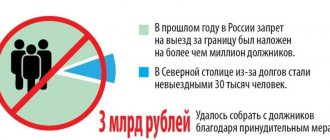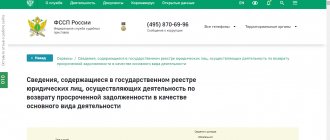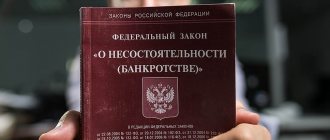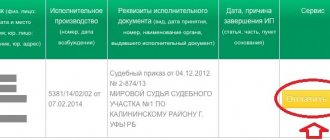In the last few years, the Federal Bailiff Service has begun to apply such an executive measure to defaulters as a temporary restriction on traveling abroad. I must say that its effectiveness is quite high. According to service statistics, more than 1 million people were included in the list of citizens with a temporary travel ban in 2020 alone. In 2020, this number increased one and a half times. Many Russians now, before planning a trip abroad, not only check the expiration dates of their passports, visas, get vaccinated, but also check whether they are included in the number of debtors on the FSSP website.
What debt can limit your right to vacation?
The country's economy has been going through difficult times over the past few years. Housing and communal services tariffs and loan rates are rising, and the real incomes of Russians are rapidly falling. Many, even conscientious payers, find themselves in a situation where it is not possible to repay the resulting debt on time.
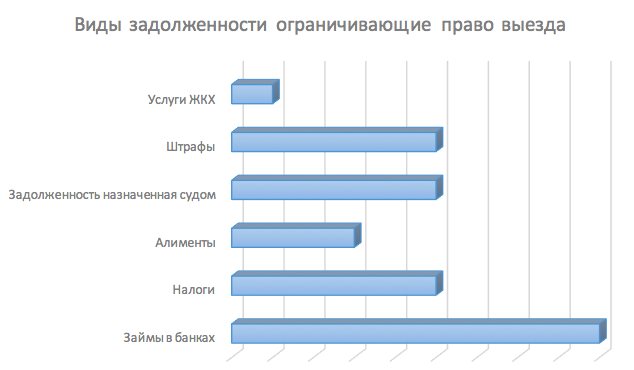
Simply put, any debts in 2020 may result in a restriction of the right to leave the Russian Federation. But this does not mean that if you are overdue on your loan for a month and have a debt to the management company for 3 months, you don’t have to dream of a summer vacation. Neither the bank nor the management company has any reason to impose any restrictions on you. They have the right to sue you. The basis for filing a claim for collection of debt from a defaulter is failure to pay for services provided within 6 calendar months.
The right of the FSSP to impose restrictions on the departure of a citizen is enshrined in Federal Law 229 “On Enforcement Proceedings”. It is important to understand here that a decision on a travel ban can only be made by a judicial authority. The bailiff implements this decision by sending a decision to restrict travel to the violator himself, as well as to the migration service and border control.
Thus, it is not the fact of the debt itself and its term that matters, but the fact of evading its payment. If a creditor sues you, the court makes a decision to collect and sends the data to the FSSP, and you do not respond to notifications and letters, in this case enforcement measures will be taken against you. These include forced collection of debt from bank accounts and deposits, seizure of property, and restrictions on travel outside the Russian Federation.
What benefits can labor veterans count on?
A veteran can count on benefits related to:
- With treatment.
- With transport.
- With benefit payments.
- With housing and communal conditions.
All benefits for veterans, be they labor or war veterans, are designed to simplify their life and make it even better and more comfortable. After all, some of these people once defended our country from enemy attacks, while others made the life of this country and its inhabitants easier and sweeter.
Such people receive at least some gratitude for their services from the state in the form of free travel on buses, trolleybuses and trams. They are also entitled to free treatment, repairs to their living quarters and even new apartments.
Anyone who has achieved the title of labor veteran will be able to enjoy all of the above benefits and receive cash benefits. Thanks to this, those who are deprived of the opportunity to earn money on their own will be able to receive it in the form of benefits for all their services to their homeland.
A pensioner also has a number of benefits and privileges that set him apart from the general mass of people. This allows him to spend less money on simple things and receive more pleasant bonuses that will save his energy and nerves.
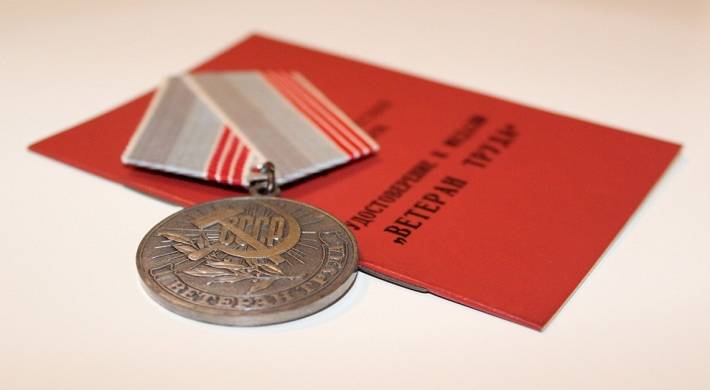
Does the amount of debt matter?
There is a lot of controversy surrounding the issue of the amount of debt that is the basis for restricting travel. Thus, the deputy of the A Just Russia party, Andrei Krutov, proposed amending Article 67 of the law on enforcement proceedings, increasing the amount of debt that prevents departure by 2 times.
Many lawyers and experts supported the initiative, explaining that in the current economic situation, with increasing fines and a decreasing purchasing power of the national currency, an amount of 10,000 rubles is not so significant. For example, this could be several fines for minor traffic violations, such as improper parking or slightly exceeding the speed limit. Thus, a huge number of completely respectable citizens who, for some reason, do not live at their place of registration and who have not received receipts to pay fines in a timely manner, may be included in the list of those prohibited from traveling abroad. Increasing the amount by at least 2 times should lead to a decrease in the number of decisions and to attracting the attention of the FSSP to truly malicious defaulters. At the moment, since October 1, 2020, the amount of debt limiting foreign travel is legislatively fixed by paragraph 1 of Article 67 of the law on enforcement proceedings - 30,000 rubles.
For debtors whose writ of execution contains demands for the collection of alimony, compensation for damage in connection with the death of the breadwinner, compensation for harm caused to health, property damage and (or) moral harm caused by a crime, travel abroad is prohibited if the amount of debt exceeds 10 000 rubles.
It does not matter whether you have a debt of this or greater size under one executive document or whether it is a total debt.
Attention! If you are sure that all you have to do is pay the receipt and take it with you, then you are mistaken. It will take time to lift travel restrictions. From October 1, 2020, copies of decisions on a temporary restriction on the debtor’s departure from the Russian Federation, on the lifting of this restriction, are sent by the bailiff to the debtor no later than the day following the day of their issuance. Taking into account possible nuances, it is advisable to ensure that no enforcement proceedings are initiated against you a month before the intended trip. This way you will have time to pay off the debt, if any, information about payment will have time to reach the FSSP in a timely manner, they will lift the restriction on travel and pass the information on to the border guards.
Why is this restriction imposed?
First of all, you should find out the cause of its occurrence and begin to solve the problem. The procedure for lifting restrictions is often delayed.
A travel ban is a type of restriction imposed by authorized services on a person. This is reflected in the databases and will be visible during customs control. Usually, airport (station, seaport, border guards) employees only announce the presence of a restraining order and refuse to allow the passenger to depart. It doesn’t matter whether he bought a ticket or not.
The reasons for the trip also do not matter - business trip, vacation, family relocation. The ban is individual in nature, i.e. he is named . Accordingly, family members or colleagues of the remaining citizen will be able to continue their journey calmly.
The legislation establishes the following reasons for imposing restrictions:
A. Citizen - military personnel, conscript, contract soldier or undergoing alternative training. Once the service is completed, permission to travel abroad will be restored. Contract military personnel can leave the country during official travel or with the permission of their command.
B. A person keeps state secrets or has access to a database of classified information. Usually these are employees of the relevant authorities. Everyone takes an oath, promising not to disclose information. They have greater control, and temporary restrictions on long-distance travel are reflected in the content of the employment contract. The ban remains for the entire period of service and 5 years after its end. Sometimes it is extended to 8-10 years.
C. Provided false information about himself when applying for a visa and other travel documents. Employees carefully check everything; if errors or deliberately incorrect data are identified, an investigation will be undertaken. The duration of the restriction depends on its reasons.
The standard period for “harmless” deceivers is 30 days , after which the citizen can resubmit the application. The period increases if serious motives for concealing information are revealed.
D. Citizen suspected or direct participant in a crime, an important witness. Or has one/several outstanding convictions.
E. Works in some government department - FSB or Ministry of Internal Affairs. Employees of such services are considered carriers of important information, and they are not allowed to leave the country. An exception is the direct permission of superiors or a business trip.
F. The person avoids complying with court orders. The most common reason for a ban. The debtor will not be released so that he does not run away. Usually these are alimony payments, credit debt, outstanding fines (traffic police and others). It is easier to lift the ban - just pay your creditor and submit the relevant documents to the bailiffs. Or reach an amicable agreement.
G. He is a minor. A child cannot be taken abroad if the parents oppose it. Both or one. Written permission is required when sending a child with a relative/stranger. When removing incapacitated people, written permission from their guardians is required.
All measures are temporary; no one can prohibit a person from leaving the country for the rest of his life. The exception is that he is a criminal who has committed serious offenses and is actively wanted. Then he will be detained by customs officers and handed over to the police. Usually the citizen himself is well aware of the ban.
How is the debtor's right to leave limited?
At least six months pass from the moment the debt is formed until the debtor is restricted from leaving. Most creditors, such as banks and management companies, go to court within 6 months after non-payment of their services. The State Traffic Safety Inspectorate and the Tax Service also file claims after this period has expired. If the court decides to collect the amount of debt from the defaulter, it notifies the Federal Bailiff Service about this, leaving it with the obligation to collect the debt by legal means.
Attention! In 2020, citizens who do not live at their place of registration are not exempt from liability for failure to pay fines and other payments. The very fact of sending a notice to the address specified in the documents is considered by law to be a notification.
Next, the bailiffs make attempts to contact the debtor in all possible ways: they call and send postal notices and letters demanding payment of the debt, and appear at the home address to deliver the notice. If the debtor evades payment of the debt within 30 days, they apply enforcement measures, including a restriction on travel if the debt amount is more than 30 thousand rubles. Bailiffs are required to notify the debtor that a decree has been issued against him to restrict travel outside the Russian Federation.
At the same time, they send the relevant information to the migration service and border control service, where a list of so-called “restricted persons” is compiled.
How to find out about debts?
You can find out about debts that have already fallen into the FSSP on the service’s website . It is enough to enter your data and the site will provide information about the enforcement proceedings initiated against you, where the amount of debts, its origin, and contacts of the territorial authority will be indicated, where you can contact to clarify the situation and pay the debt. You can also print payment receipts on the website and pay them in a way convenient for you.
The very fact that proceedings are being carried out against you does not mean that travel outside the Russian Federation is already prohibited. You have the right to clarify exactly what restrictive measures apply to you at the moment and what actions you need to take to remove them in the territorial authority where the proceedings are located.
For the convenience of citizens, there is an “interactive assistant” on the FSSP website, and it is also possible to subscribe to the database of enforcement proceedings in order to learn about debts in a timely manner. Information about the presence of tax debts is available on the website of the Federal Tax Service in your personal account. You can find out if you have unpaid fines on the website of the Traffic Police Department.
Police officer
A policeman always guards order, he protects the peace of the teacher and the doctor, and everyone who is around him. Civilians can calmly walk the streets, buy food, cars, jewelry, equipment, and so on, and they can also visit guests without fear of anyone, because they know that if something happens to them, the one who did, will appear in court very soon.
Thanks to the police, life becomes calmer and more beautiful, because you don’t worry about being stabbed on the street or having your bag with money taken away. A feeling of calm and security gives a person the opportunity to relax and go about his business, without the fear that someone’s greed or bloodthirstiness will overtake him.
No matter what anyone says about corruption and nepotism among the police, in the general understanding, policemen represent the law that protects ordinary people from bandits, swindlers and murderers. If it weren’t for them, chaos and lawlessness would reign in the world, but as it is, this is at least somehow restrained.
Then there is the question of morality and conscience, who is capable of what and what they cannot afford to do. For example, there are people who, thanks to their cunning, intelligence and perseverance, reach high heights without a criminal intent, and there are those who trade only for them, often get caught doing it, and spend their whole lives in prison.
The work of a police officer is paid as little as that of a doctor, but it is just as important. After all, if there are no police, anarchy will be created in the country, caused by thieves in law and their henchmen, so this possibility cannot be allowed.
Payment Methods
There are many payment methods and many of them can be made without leaving your home or office:
- Through the bank of enforcement proceedings on the FSSP website (you can choose a convenient payment service - payment system Oplatagosuslug.ru, Robokassa, Qiwi Wallet, WebMoney, Yandex.Money, etc.)
- Through Sberbank online (for Sberbank clients there are FSSP tabs in their personal account);
- Through the FSSP mobile device application;
- At the FSSP Office at the place of registration;
- Print the receipt on the FSSP website and pay in any convenient way - at a credit institution, through an online system, etc.
The government is constantly talking about the need to make changes to the legislation, in particular regarding the amount of debt limiting travel, as well as the period for transferring information from the FSSP to the migration service. At this time, we advise you to ensure that no enforcement action is taken against you at least a month before your intended trip.
Cash payments and compensation instead of receiving benefits
Sometimes a veteran may be offered a supplement to his or her current benefit in lieu of regular benefits and benefits. So he will decide for himself what to spend his money on:
- For transport.
- For food.
- In housing and communal services.
- For travel.
A person can be a spendthrift and spend the entire amount in a few weeks, or he can be thrifty and extremely resourceful, and live many times better than some wealthy citizens of our vast country. It is difficult to predict who will be who in a given situation, but the mere existence of such an opportunity for veterans opens up many doors and paths for them that they can use.

